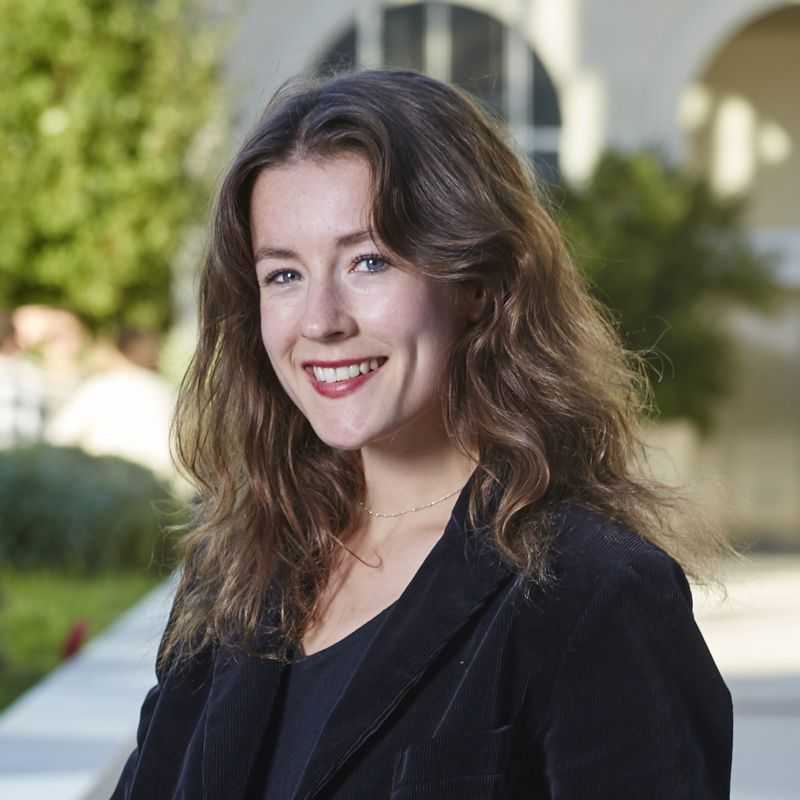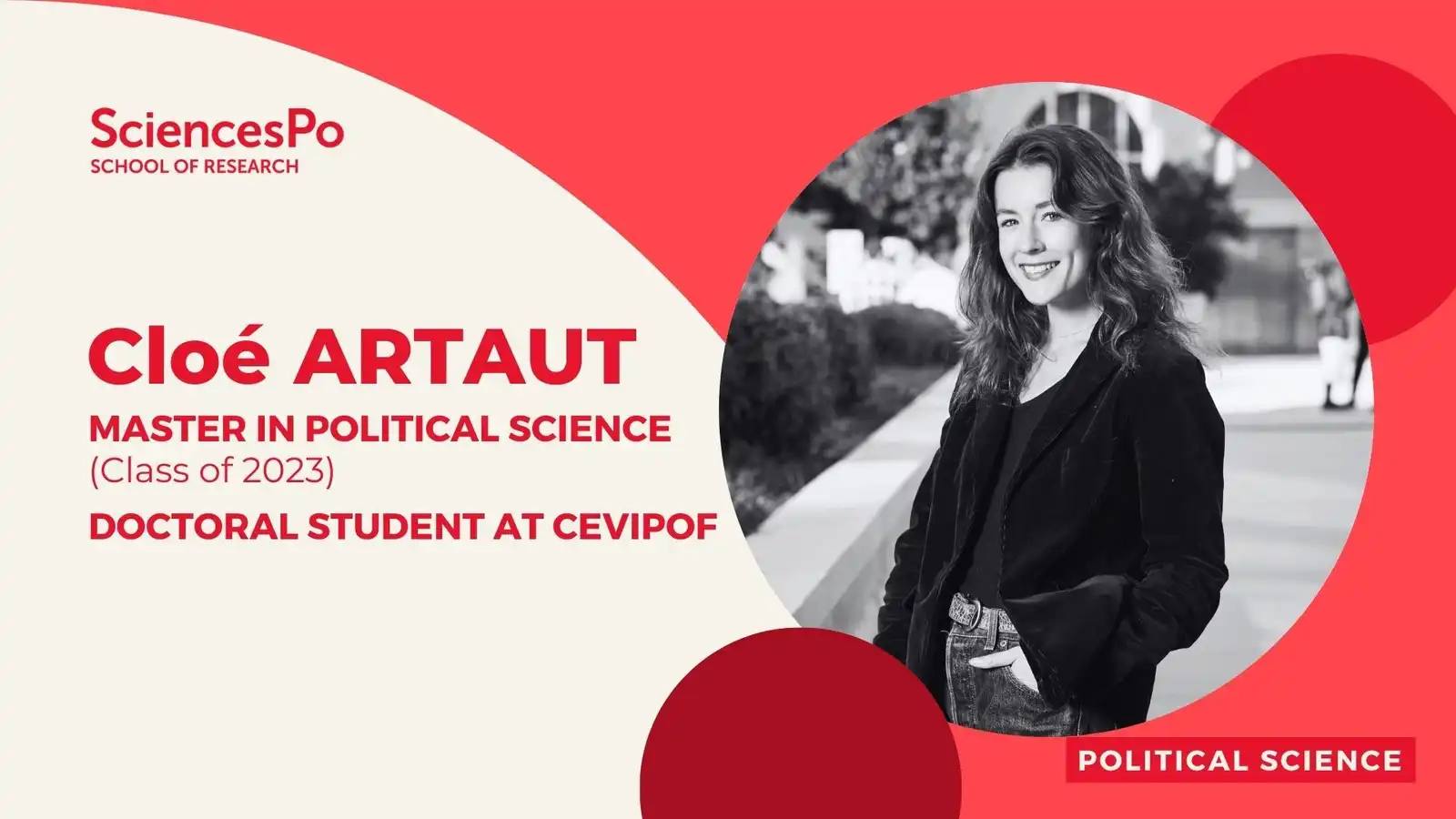Home> Cloé ARTAUT, Class of 2023
20.06.2024
Cloé ARTAUT, Class of 2023
CAN YOU TELL US ABOUT YOUR ACADEMIC CAREER? HOW DID YOU BECOME INTERESTED IN POLITICAL SCIENCE?
My academic background is a bit atypical: after preparing for the entrance exam to the École normale supérieure in law and economics, I obtained a degree in public law and a degree in political science before joining the master's programme in political science offered by the School of Research at Sciences Po, first in the Political Behaviour major and then in Political Theory.
At the same time, I began a bachelor's and then a master's degree in modern literature at the University of Paris III (Sorbonne Nouvelle). My interest in political science began quite early. When I was little, I loved reading and writing and I wanted to be a journalist. I wasn't yet familiar with the research profession (at 5 or 6 years old, you rarely know what a "teacher-researcher" is!) but I think I was already attracted by the idea of seeking out information, discovering new keys to understanding the world in which we live, and grasping its structures and logic. From secondary school onwards, I became particularly interested in political concepts. They saturate public debate on a daily basis and I felt it was necessary to understand both their meanings and their origins, so as to be able to clarify the meaning of political discourse. The history of ideas, the branch of political science that I later chose, enables me to do just that.
WHAT HAVE YOUR YEARS AT THE SCHOOL OF RESEARCH BROUGHT YOU? WHAT MEMORIES DO YOU HAVE OF YOUR SCHOOL, YOUR CLASS,YOUR TEACHERS?
Over and above my knowledge of very specific subjects (democracy, secularism, human rights, etc.), I think that my years studying at the School of Research gave me the tools to think more clearly and, above all - and this is very important in research - to ask the right questions. It sounds very basic, but it's actually very valuable: without a good question, there can be no good answer.
I also remember a very warm and caring atmosphere at the School of Research. The fact that we work in small classes means that we get completely personal attention from the teachers and teaching teams, which is rarely possible at university or even at other Sciences Po schools. The very international aspect of the school also means that students are better prepared for the realities of today's highly globalised research world.

« I think that my years studying at the School of Research have given me the tools to think more clearly and, above all - and this is very important in research - to ask the right questions. That sounds very basic, but it's actually very valuable: without a good question, there can't be a good answer. »
Cloé ARTAUT
Doctoral student at CEVIPOF
WHICH TEACHER OR COURSE OF STUDY HAS MADE THE MOST MARKED YOU?
I'll take the liberty of cheating and mention two: Astrid von Busekist, who heads the master's degree in political theory, and Philippe Portier, professor at the EPHE. They represent very different visions of teaching, but each has something to contribute. Philippe Portier embodies a quasi-romantic figure of the university professor, a great teacher who manages, through the simple use of words, to pass on centuries of knowledge in fascinating lectures where everything seems crystal clear. Astrid von Busekist's courses are much more centred on debate and collective discussion, enabling students to learn to think 'live' about highly complex problems. She herself is fascinating and has a particular gift for teaching us to look at fundamental philosophical controversies or current events in a different light and question received ideas.
WHAT IS YOUR CURRENT POSITION?
I am now a doctoral student at CEVIPOF, lone of the three political science research centres at Sciences Po.
WHAT WERE THE MAIN STAGES IN THE DEVELOPMENT OF YOUR CAREER PLAN?
I was lucky enough to know at secondary school that I wanted to be a teacher-researcher, so building my career plan wasn't too difficult. In the classic way, I did a research master's degree, then wrote a dissertation in M2, which led to me being accepted for a thesis. You don't really need to do internships in research, that's the advantage!
HOW HAS YOUR TRAINING CONTRIBUTED TO YOUR CURRENT POSITION?
I can think of at least three. In terms of knowledge, I took courses related to the themes I'm working on for my thesis and which are therefore very useful to me today.
Secondly, as I said earlier, the courses I took during my Masters enabled me to acquire the methods needed to carry out a research project. Finally, attending the seminars organised by the political theory department at Sciences Po during my master's years (Cercle des humanités politiques, SPOT Seminar, etc.) helped me to familiarise myself with the world of research.
WOULD YOU HAVE ANY ADVICE FOR A STUDENT WHO WANTS TO THE SECTOR IN WHICH YOU WORK TODAY?
I don't think it's said enough, but one of the most important aspects of research is knowing how to surround yourself with the right people. Research is knowing how to surround yourself with the right people: working with a specialist in your subject is obviously always a good thing, but choosing someone with whom you get on well, who will be sympathetic while also being able to tell you what's going wrong or advise you on the strategic choices to be made during your course is very important. Before you apply for a PhD, don't hesitate to write to other PhD students to get their feedback on their experience with a particular teacher or research centre, because this contributes greatly to your well-being (and therefore your success) in the years to come.

